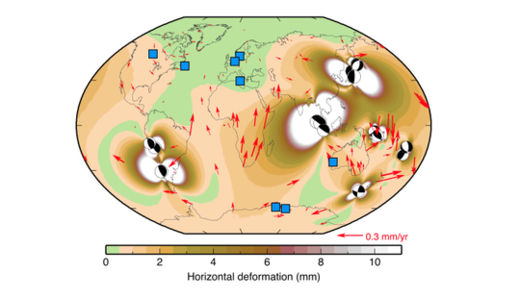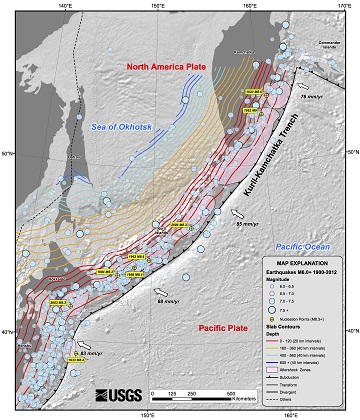
© Paul Tregoning, Journal of Geophysical ResearchDeformation from earthquakes bigger than magnitude 8.0 since 2000. The blue squares are GPS reference sites, and the red arrows are deformation from big earthquakes.
Twelve years of supersized earthquakes have contaminated GPS sites around the world, a new study finds.
The
Global Positioning System is a network of satellites and ground stations that provide location information anywhere on Earth. Except for spots in Australia, western Europe and the eastern tip of Canada, every GPS site on the ground underwent small but important shifts since 2000 because of big earthquakes, according to a study published May 6 in the
Journal of Geophysical Research: Solid Earth.The research confirms that great
earthquakes, those bigger than magnitude 8.0, can have far-reaching effects on the Earth's crust. And because GPS is critical for everything from calculating satellite orbits to sea level rise to earthquake hazards, scientists can't ignore these tiny zigs and zags, the researchers conclude.
"We have to find a way to deal with it," said Paul Tregoning, lead study author and a geophysicist at Australia National University in Canberra. "The community needs to work out how to find all the offsets, estimate them accurately and get everyone to agree on how to correct them," he told LiveScience.
Tregoning and his colleagues modeled the sudden jolts in Earth's crust from each of the 15
biggest earthquakes since 2000. They discovered that crust thousands of miles away from the faults had moved horizontally by as much as a tenth of an inch (a few millimeters). The model was checked against a few spots around the planet. On average, the earthquakes deformed the crust by a hundredth of an inch every year (0.4 millimeters a year) - about the width of the lead in a mechanical pencil.
"It's quite amazing to us that we can see this and detect this," Tregoning said.
These tiny effects won't make a difference to the GPS in cars or phones, or the tough little units carried by hikers and mountaineers. But scientists who need precise measurements to calculate sea level rise or satellite orbits should be concerned, Tregoning said.


